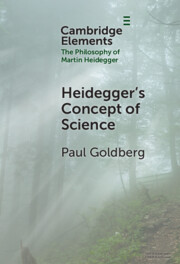Element contents
Heidegger's Concept of Science
Published online by Cambridge University Press: 27 November 2024
Summary
Information
- Type
- Element
- Information
- Online ISBN: 9781009523523Publisher: Cambridge University PressPrint publication: 12 December 2024
References
Accessibility standard: Unknown
Why this information is here
This section outlines the accessibility features of this content - including support for screen readers, full keyboard navigation and high-contrast display options. This may not be relevant for you.Accessibility Information
- 9
- Cited by
